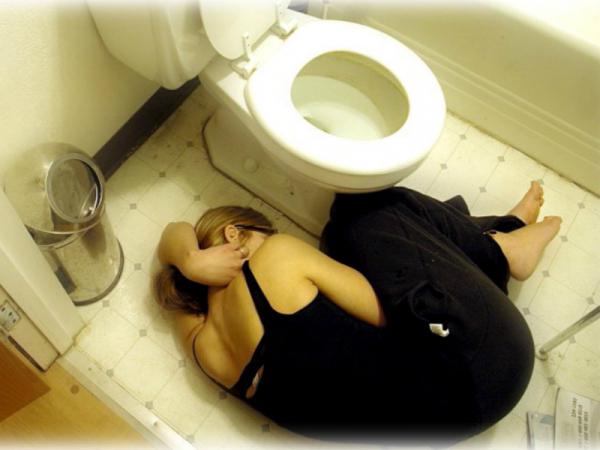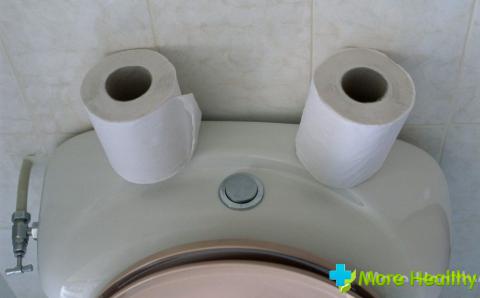What can cause long-term loose stools? Various pathological conditions. Its appearance can be provoked by inflammatory bowel diseases, bacterial infections, malignant neoplasms, ischemic pathologies intestinal tract, diseases associated with a lack of enzymes, anatomical functional failure of organs located in the abdominal cavity. Very often, prolonged diarrhea (diarrhea) occurs due to damage to the intestines, the presence of immune diseases that last for a long time, drug intolerance. Only a qualified doctor can help you understand what to do in such a situation.
Causes of prolonged diarrhea
 Common causes of prolonged diarrhea are non-compliance with diet rules, therapeutic fasting, and constant use of drugs that inhibit intestinal motility. Diarrhea can occur due to hormonal imbalances and the development of certain brain diseases. Appear on long time loose stools may be due to surgical interventions in the gastrointestinal tract, in the presence of irritable bowel syndrome, systemic sclerosis. Some medications - antacids and cholinomimetic tablets - can provoke loose stools.
Common causes of prolonged diarrhea are non-compliance with diet rules, therapeutic fasting, and constant use of drugs that inhibit intestinal motility. Diarrhea can occur due to hormonal imbalances and the development of certain brain diseases. Appear on long time loose stools may be due to surgical interventions in the gastrointestinal tract, in the presence of irritable bowel syndrome, systemic sclerosis. Some medications - antacids and cholinomimetic tablets - can provoke loose stools.
It is possible to make an accurate diagnosis and understand what to do only after a thorough medical examination and collection of a general history. A detailed clinical picture is the key to identifying provoking factors and building not a temporary, but a permanent treatment regimen.
Features of the clinic for prolonged loose stools
 For example, prolonged diarrhea in an adult and a child can occur against the background of abdominal pain, strong rumbling in the intestines, constant bloating, fever and systematic weight loss. It is imperative to consult a doctor if you experience prolonged loose stools with blood or a large amount of pus released during bowel movements. With a lack of enzymes, loose stools contain remains of undigested food. Often, prolonged diarrhea does not cause any painful sensations, discomfort is the only inconvenience that you have to put up with. To eliminate it, it is necessary to identify the causes of the malaise. Laboratory tests will help you do this.
For example, prolonged diarrhea in an adult and a child can occur against the background of abdominal pain, strong rumbling in the intestines, constant bloating, fever and systematic weight loss. It is imperative to consult a doctor if you experience prolonged loose stools with blood or a large amount of pus released during bowel movements. With a lack of enzymes, loose stools contain remains of undigested food. Often, prolonged diarrhea does not cause any painful sensations, discomfort is the only inconvenience that you have to put up with. To eliminate it, it is necessary to identify the causes of the malaise. Laboratory tests will help you do this.
In addition, it is possible to use instrumental diagnostics during the examination. Irrigography, rectocolonoscopy, and biopsy help to identify the provocateurs of loose stools, which makes it possible to detect the oncological cause of long-term illness. Differential diagnosis helps to identify provoking factors for prolonged diarrhea in adult patients, as well as in children. It also allows you to outline the correct line of treatment and eliminate indigestion.
How to treat long-term diarrhea?
 In adults and children during an exacerbation, effective treatment of prolonged diarrhea is carried out in a comprehensive manner. During therapy, the patient is prescribed:
In adults and children during an exacerbation, effective treatment of prolonged diarrhea is carried out in a comprehensive manner. During therapy, the patient is prescribed:
- Medications that can eliminate the symptoms associated with prolonged diarrhea. A patient with prolonged diarrhea may be prescribed painkillers and special anti-diarrhea medications. Herbal medicine is actively included in the treatment process ( medicinal herbs, teas and infusions).
- A diet that can slow down intestinal motility and prevent the appearance of loose stools during an exacerbation. Both adults and children are advised to exclude from the diet foods that stimulate the motor-evacuation function of the intestine, as well as those dishes that enhance the secretory function of the intestine. The basis of the diet should be dishes prepared from lean meat, boiled lean fish, lean soups, jelly, baked apples are allowed.
- Motor regulators.
- An important part of therapy is restoration of water-salt balance.
Loose stools can occur for a long time for various reasons. In the absence of treatment, prolonged diarrhea, at best, will simply reduce the quality of life; at worst, malaise will lead to the appearance of the first signs of dehydration. With prolonged diarrhea, the water-salt balance is disturbed and the body leaves the body along with loose stools. useful microelements, important nutrients. Such a loss can provoke disruptions in the functioning of vital systems of the body. That is why any upset stomach and loose stools should not be ignored. It is important to seek help from specialists in a timely manner and strictly adhere to the principles of complex therapy.
Doctors note that it is necessary to treat every attack of indigestion and diarrhea. If at the very a short time start therapy, the less often exacerbations will occur, the more realistic it is to avoid the most dangerous complication - dehydration of the body. Knowing what can cause prolonged loose stools, it is not difficult to take all necessary measures to prevent the appearance of an undesirable clinical picture.
One of the manifestations of problems with intestinal functioning is diarrhea, which can sometimes last for a very long time. Are you worried about prolonged diarrhea? Find out what to do in such a situation in this article.
Causes of prolonged diarrhea
If the symptoms of prolonged diarrhea last for a long time and are accompanied by pain, you cannot limit yourself to self-medication. Indeed, in such situations, hospitalization and professional intervention are often necessary.
It is no secret that often the problem of long-term diarrhea is various intestinal infections, which we can introduce into the body through raw water or stale food. In this case, as a rule, the disease does not last long. The main thing is to react in time to deterioration in health, cleanse the body, and also follow a gentle diet for some time.
Also, sometimes prolonged diarrhea is of a viral nature, which is more typical in winter, seasonal viral diseases. It is also important to follow a diet, as well as actively work on treating the disease. It is important to remember that without eliminating the root cause, it will be quite difficult to get rid of prolonged diarrhea, as well as prevent its recurrence.
Also, the cause of the disease can be various chronic diseases, which can worsen as a result of weakened immunity or other factors that can provoke exacerbation. In general, the causes of the disease are quite different, so the methods for eliminating the problems can also be very diverse.
What to do in case of prolonged diarrhea?
If diarrhea does not go away for a long time, you should follow a diet until it is defeated. This will help your body not to be overloaded and protect it from possible complications.
But the main thing in such a situation is to contact a specialist who will be more qualified to determine the cause and carry out a course of treatment for long-term diarrhea. Remember that diarrhea may be just one sign of more serious problems in organism. And they do not always concern the digestive system.
Moreover, if you notice symptoms of this type: pain or bleeding, this is a signal that hospitalization is inevitable. You should not delay seeing a doctor so as not to create unnecessary difficulties and problems for yourself.
For diarrhea in adults, treatment should begin as early as possible; not only the restoration of intestinal function, but also the general condition of the person depends on this. Without treatment, it leads to serious complications, one of which - dehydration - can be fatal.
Diarrhea is a single or repeated bowel movement with the release of liquid feces. It is a manifestation of many diseases, in the clinical manifestations of which diarrhea occupies a central place. The list of such pathologies is quite long.
Diseases associated with diarrhea
First of all, diarrhea is a manifestation of many infectious diseases:
Acute (intestinal infections that occur violently, with an increase in temperature, severe intoxication: salmonellosis, dysentery, cholera, etc.);
Chronic (lasting for years, sluggish: tuberculosis, intestinal syphilis).
Diseases that cause diarrhea include long list various infectious and chronic pathologies that are associated with infectious agents or intestinal dysfunction:
1. Pathology associated with intestinal dysfunction (irritable bowel syndrome (IBS), dyskinesia).
2. Helminthiases (ascariasis, enterobiasis, etc.) and protozoan infections (amoebiasis, giardiasis).
3. Dysbacteriosis as a result of treatment with antibiotics.
4. Nonspecific inflammatory bowel diseases (Crohn's disease, ulcerative colitis).
5. Diseases occurring with dystrophic changes in the intestinal wall (amyloidosis, collagenosis, celiac disease).
6. Toxic damage to the intestines due to alcoholism, poisoning with medications, salts of heavy metals, uremia.
7. Neoplasms and postoperative conditions (after colon resection).
Diseases not related to intestinal pathology
Diarrhea can be a manifestation of pathology of other organs and systems (not the intestines):
Diseases with reduced acid-forming function of the stomach (atrophic gastritis, cancer, condition after gastrectomy);
Pathology of the pancreas (pancreatitis, tumor of the head of the pancreas);
Liver diseases;
Systemic vasculitis;
Vitamin deficiencies of group B - take it, take it, pellagra;
Allergies;
Neuroses;
Sudden changes in style and quality of food - traveler's diarrhea.
Mechanisms of development of diarrhea in adults
The mechanisms of diarrhea pathogenesis in the listed cases are as follows:
Slowing down the absorption of fluid from the intestinal lumen - osmolar diarrhea occurs: frequent heavy bowel movements with fat and undigested food particles;
Hypersecretory diarrhea: the secretory function of the intestines is increased - a lot of water and salts are released into the intestines, a large number of watery stool;
Motor function is reduced - hypokinetic diarrhea: a small amount of fetid feces, watery or mushy in consistency;
Accelerated passage through the intestines - hyperkinetic diarrhea: characterized by a liquid or mushy consistency, a small amount of feces, absence (or insignificant)
When exposed to psychogenic factors, propulsive intestinal motility may occur, which leads to diarrhea.
Types of diarrhea in adults
Depending on the reasons that caused diarrhea, it is conventionally divided into:
Infectious;
Nutritional - for food poisoning;
Dyspeptic - in case of dysfunction of the digestive organs;
Toxic - in case of poisoning with toxic substances (arsenic, mercury);
Medication - after taking certain medications due to their toxicity or the development of dysbacteriosis;
Neurogenic - in a state of stressful situations, mental or emotional disorders.
Manifestations of diarrhea
Taking into account the cause and level of localization of pathology in the intestines, diarrhea differs in the number and frequency of bowel movements - single or multiple, abundant or scanty, and the nature of the discharge (color, impurities, smell).
Diarrhea is accompanied by abdominal pain, nausea and vomiting (but this does not always happen), high fever with infectious diarrhea, general malaise, severe weakness, and lethargy. In case of dehydration, dry mucous membranes, decreased blood pressure, rare urination or anuria, convulsions indicating a high degree of dehydration, and impaired consciousness are observed.
It is necessary to urgently consult a doctor in the following cases:
Duration of diarrhea for 3 or more days;
. “unreasonable” appearance of diarrhea;
Diarrhea is accompanied by scleral icterus, abdominal pain, high temperature, insomnia;
Black or dark feces - Green colour mixed with blood.
First aid
For diarrhea in adults, treatment should begin immediately, regardless of the underlying cause. First aid includes:
1. Dehydration therapy, aimed at replenishing the volume of lost fluid, in order to prevent dehydration of the body and loss of microelements. This is due to the development of severe complications; it is necessary to begin immediately before examining a doctor. At home, this is drinking plenty of Regidron (a ready-made pharmaceutical powder, soluble in water, containing a glucose-electrolyte mixture) or another solution (Gastrolit, Citroglucosan), or saline solution or prepared saline solution up to 2 - 3 liters per day in the absence of contraindications.
2. Taking an absorbent in an adequate dose: the most affordable activated carbon in a dosage of 5 - 10 tablets, depending on the weight and severity of the disease. This is a water-insoluble preparation based on vegetable or animal charcoal. If taken simultaneously with other medications, the treatment will be ineffective: it will neutralize the effect of any medications taken at the same time and becomes ineffective in treating diarrhea.
3. Strict diet: skip 2 - 3 or more meals. Meals should be divided into small portions. For anti-inflammatory purposes, you can drink tea from chamomile, oak bark, and herbal decoctions. You need to drink frequently, as long as the diarrhea lasts.
Comprehensive treatment of diarrhea in adults
If diarrhea develops in adults, treatment should be comprehensive and include, in addition to diet, taking medications. Only a doctor can prescribe medications after examination and necessary laboratory tests. Drug therapy is varied, depends on the etiology and pathogenesis of the disease, and includes drugs of different classes.
Antibacterial therapy
Use of sorbents
Sorbents (activated carbon, Polysorb, Polyphepan, Enterosgel, etc.) are designed to remove toxic substances, gases, waste products of pathogenic bacteria and viruses. By adsorbing gases and toxic substances, they reduce intoxication and flatulence, and are taken between meals and other medications.
Probiotic preparations
Probiotics (Linex, Enterozermina, Baktisuptil, Bifidumbacterin, Ribolak, etc.) help restore normal intestinal microflora during dysbacteriosis and increase the overall immune status of the body.
Enzymes
Enzyme preparations (Creon, Mezim-Forte, Pancreatin, etc.) are used for diarrhea associated with enzymatic disorders: exacerbation of pancreatitis with severe exocrine insufficiency, overeating, gross dietary violations, etc. They help normalize the digestion process and the formation of normal feces .
Opioid drugs
Drugs that affect intestinal motility (Imodium /Loperamide/). For hypermotor diarrhea in adults, treatment includes the prescription of these drugs, because due to high peristalsis, the process of evacuation from the intestines is accelerated, which leads to diarrhea. Effective for irritable bowel syndrome, stressful situations, for traveler's diarrhea.
Antispasmodics
Antispasmodics (drotaverine /No-spa, Spasmol, Spasmoverine/, papaverine, Duspatalin /Meverin, Sparex/, Buscopan, etc.). For diarrhea in adults, treatment of pain associated with increased peristalsis (spasms) is carried out with antispasmodics related to different groups drugs having different mechanism actions, but effectively relieving pain, discomfort, and discomfort in the intestines. Can be used combination drugs: Meteospasmil, Spazmalgon.
Anti-inflammatory treatment
Non-hormonal anti-inflammatory (NSAIDs) and hormonal drugs (Indomethacin, Sulfasalazine, prednisolone /Metypred/, etc.) are used for severe inflammation in the intestines with chronic diarrhea (ulcerative colitis).
You must always remember that, despite the over-the-counter sale of the listed medicines for diarrhea in adults, treatment can only be prescribed by a doctor, since each of the drugs has contraindications and serious side effects, as well as special indications for use, which can only be determined by a specialist - therapist, gastroenterologist, infectious disease specialist. The sooner you seek medical help, the treatment is more effective and fewer serious complications. In the absence of timely adequate treatment, diarrhea can become chronic.
Prolonged diarrhea is dangerous phenomenon. In cases where the duration of diarrhea is about three days or more, we can say that the diarrhea is prolonged. And if loose stools begin in an acute form and last for about two weeks, then this is doubly dangerous.
Prolonged diarrhea and its consequences
In such cases, certain actions should be taken urgently. After all, this is dehydration, and this is a rather dangerous consequence.
With diarrhea, a person not only feels uncomfortable, but when the diarrhea drags on, mental and autonomic system disorders occur.
- Dizziness, general weakness of the body, and seizures appear. This phenomenon mainly occurs after taking antibiotics.
- In addition, prolonged diarrhea can be due to an intestinal infection, childhood anemia, or transfer to artificial formula feeding.
- Causes of severe diarrhea include bacterial infection. These are the consequences of dirty food and drinks. Food poisoning is accompanied by vomiting, diarrhea, and abdominal pain.
If treated correctly, diarrhea will go away within a few days. But if everything remains the same, then you need to consult a doctor. Based on the tests taken, the doctor will be able to find the reasons and understand why the diarrhea is prolonged.
Types of prolonged diarrhea
Daily diarrhea manifests itself in the form of liquid stool in the morning, and then during the day stool of normal consistency. It is not dangerous if one-time liquid bowel movements occur. If there is no water, blood, mucus in the stool, there is no vomiting and no pain, then the cause of such diarrhea may be poor nutrition, use of laxatives, pregnancy, as well as chronic alcoholism.
Toxic diarrhea
Toxic diarrhea may result from damage to the intestinal lining  various toxins. It's about about poisoning with heavy metals, nicotine, and ethyl alcohol. When a person is poisoned by arsenic, vomiting, pain in the abdomen, severe diarrhea, and severe dehydration occur. This diagnosis is confirmed by chemical analysis of the nail plate and hair.
various toxins. It's about about poisoning with heavy metals, nicotine, and ethyl alcohol. When a person is poisoned by arsenic, vomiting, pain in the abdomen, severe diarrhea, and severe dehydration occur. This diagnosis is confirmed by chemical analysis of the nail plate and hair.
Diarrhea after sex
Diarrhea after sex is a consequence of anal sex. Experts are confident that anal sex does not harm the body. But you should do it correctly. Sometimes it causes diarrhea. This is due to the fact that before intercourse itself, enemas are done for cleansing. After all, the intestines may not absorb all the water, so it remains. And then he wants to go outside. In addition, if an enema is given hot water, then this can also lead to diarrhea. During anal sex, the walls of the rectum are relaxed. If a person ate heavily before the act, then there may also be diarrhea. There are products that transit through the body. Therefore, loose stools may also appear.
Differential diagnosis of diarrhea
 If loose stools last a long time, differential diagnosis is used to identify its causes. The presence of blood in the stool is excluded. In addition, pay attention to signs of dehydration. If dehydration is suddenly observed, the person is admitted to hospital treatment. If there is no dehydration, then persistent diarrhea can be treated. This generally occurs within five days. In a conversation with the patient, the doctor finds out why the patient has diarrhea, what type of stool, what kind of diet the patient has, and whether he drinks enough fluid. The main role is given to physical examination. We are talking about things like how often a person goes to the toilet, whether there are certain impurities in the stool, and what else is accompanied by diarrhea. An important point is whether there are disturbances in consciousness, anxiety, thirst.
If loose stools last a long time, differential diagnosis is used to identify its causes. The presence of blood in the stool is excluded. In addition, pay attention to signs of dehydration. If dehydration is suddenly observed, the person is admitted to hospital treatment. If there is no dehydration, then persistent diarrhea can be treated. This generally occurs within five days. In a conversation with the patient, the doctor finds out why the patient has diarrhea, what type of stool, what kind of diet the patient has, and whether he drinks enough fluid. The main role is given to physical examination. We are talking about things like how often a person goes to the toilet, whether there are certain impurities in the stool, and what else is accompanied by diarrhea. An important point is whether there are disturbances in consciousness, anxiety, thirst.
Once the causes of prolonged diarrhea have been determined, treatment can be selected. The main goal is to normalize the consistency of stool. Patients are prescribed a diet and undergo therapy. Products should not burden the digestive tract; food must be processed. None raw vegetables or fruit. It is allowed to cook food in a double boiler. It is not recommended to consume foods that irritate and contribute to the formation of fermentation processes. With the help of medications, they get rid of dehydration, replenish vitamins and minerals, metabolic processes, and intestinal microflora.
The human body is an intelligent, self-governing and self-healing system that is capable of maintaining optimal internal balance under favorable conditions. external conditions. Numerous bacteria and viruses coexist safely in the body until the immune system closely monitors the balance of power. Defense mechanisms are quickly triggered in the event of an imbalance of internal or unauthorized interference of adverse factors from the outside.
Functional diarrhea
Frequent urge to defecate with loose, watery stools are considered symptoms. How a cough and runny nose cleanse the respiratory system and indicate dysfunction respiratory system, diarrhea is a radical way to get rid of activated microbes or low-quality food products. Diarrhea is the body's natural reaction to problems in the digestive system.
The most harmless is considered to be functional diarrhea, which occurs as a reaction to excessive anxiety or a state of fear. As a result of too active intestinal motility, food does not have time to be digested and nutrients are not absorbed, which can cause diarrhea. A typical cause is the consumption of low-quality, rough food, which the body is in a hurry to get rid of.
Acute forms of diarrhea
But if diarrhea begins at night, it is accompanied acute pain in the abdominal area, profuse vomiting, fever, then you should immediately consult a doctor. Diarrhea can be secretory, osmotic, inflammatory, exudative and dysenteric. Chronic diarrhea, which lasts up to three months, can be caused by viruses or bacteria, the use of laxatives, and also accompany chronic diseases and ulcerative colitis.

Irritable bowel syndrome, lactose intolerance, and taking antibiotics can also cause diarrhea. Prolonged diarrhea usually indicates problems with the intestines. If diarrhea has already been going on for 3 months, then there is nowhere to delay it; you will have to be examined to find its cause. Do not self-medicate, especially if diarrhea is accompanied by pain, mucus or blood in the stool.
Possible causes of prolonged diarrhea
Often the cause of diarrhea is ordinary food poisoning, when some low-quality product is eaten, but in this case, diarrhea usually does not last long; it is enough to follow a diet for a while, and normal stool will be restored. It is worse if diarrhea appears as a result of a viral infection, for example, rotavirus. In this case, it will not go away without eliminating the cause; just following a diet will not be enough.
Diarrhea can also result from an exacerbation of any chronic diseases (colitis, dysfunction of the stomach or pancreas, etc.), constant poor nutrition, allergies to certain foods or medications.
Treatment of diarrhea
In case of such long-term diarrhea as diarrhea for 3 months, you will have to undergo stool, blood and urine tests and undergo intestinal diagnostics using X-ray examination to determine the cause of the diarrhea. Treatment will consist of eliminating this cause.

These could be problems with the intestines, stomach, pancreas, and in each case the appropriate medicine will be prescribed. In addition, since fluid is lost during diarrhea, a drug is recommended to compensate for this loss, for example, Regidron, Citroglucosan. A gentle diet is also recommended.
A dangerous complication is dehydration.
Prolonged diarrhea can cause dehydration if the body loses about 3% of its weight. There is a simple and reliable test to check the body's water balance, which takes into account the delay time of capillary wall permeability. To carry out the test, you need to press on the nail plate of your finger and see how quickly the pale skin returns to its normal color. pink color. If the interval is more than 2 seconds, we can talk about dehydration.
The frequency and quantity of urination may also indicate water balance. If the color of the urine is dark and concentrated, and the pauses are more than 8 hours, this may not be a good symptom. Dry mouth (dry lips are not an indicator), lack of tears, depression or nervousness and irritability, accompanied by weakness and dizziness, disorientation in time and space - these are signs of dehydration, which can result in coma or even death.
Diarrhea is especially dangerous in children. If frequent stools acquire a greenish tint, become even more watery and gushing, you need to take immediate action. The body must be treated with respect and care in order to avoid misunderstandings such as diarrhea, no matter how harmless it may seem.

